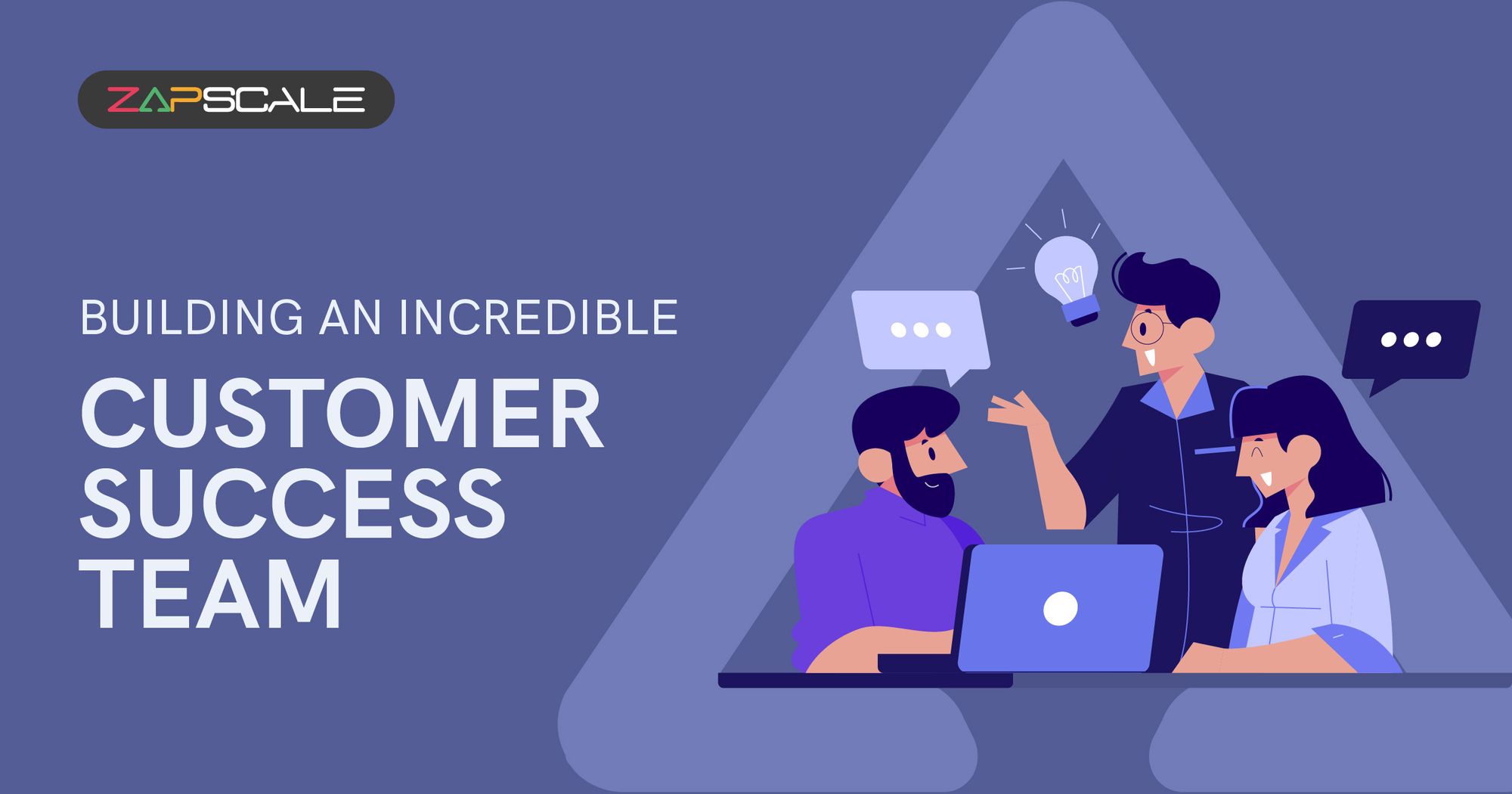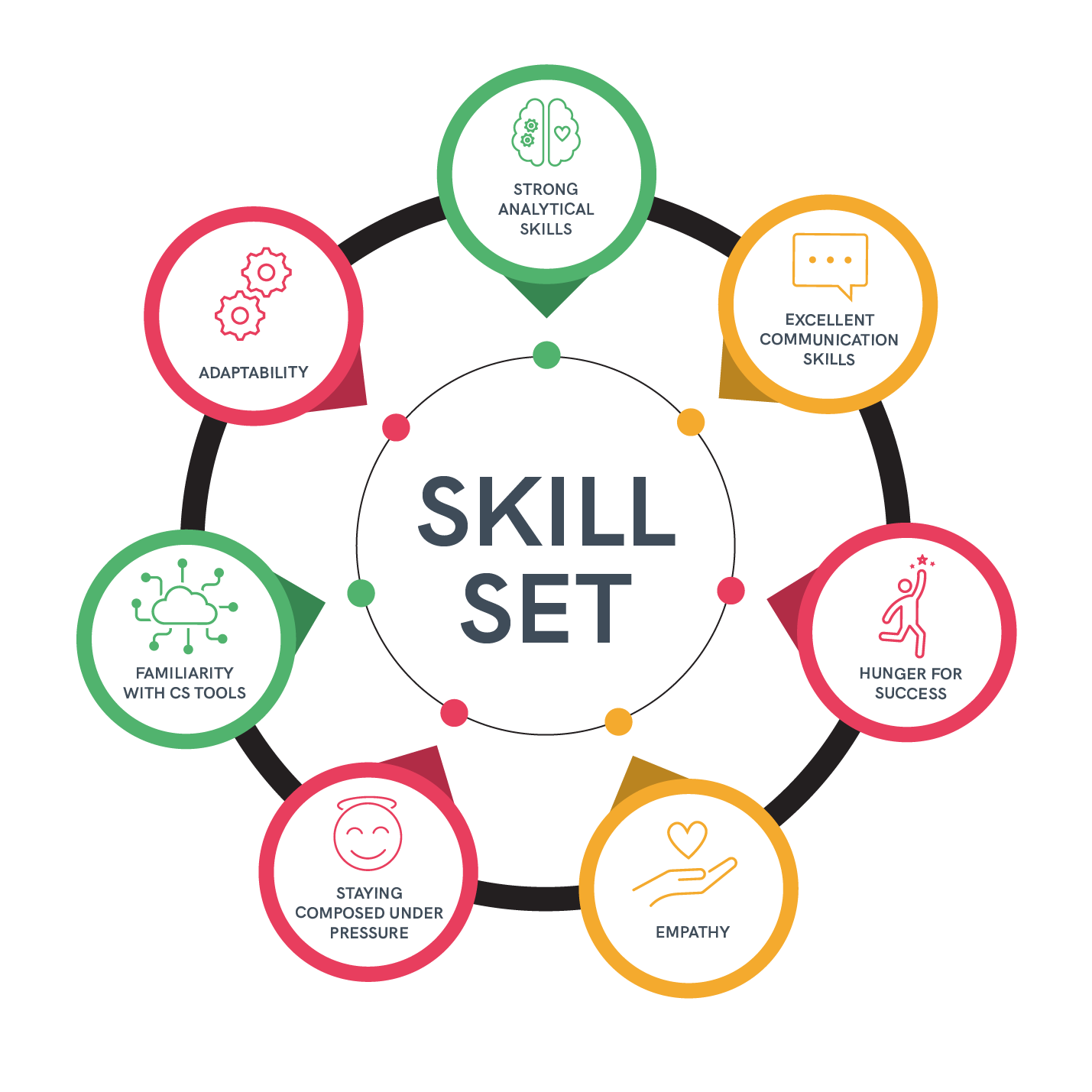CATEGORY > Customer Success Management
How To Build a High-Performing Customer Success Team

For B2B SaaS businesses, the establishment of a robust Customer Success team stands as a pivotal stride toward ensuring sustained growth and customer satisfaction. In this article, I’m going to discuss the intricacies of crafting an exceptional customer success team.
- When to start building your CS team?
- What to expect from your CS team?
- Whom do you need to hire?
- What skills do your CS team need to have?
Customer success has become a crucial element for any organization that wants to retain its customers and enhance its overall experience. Leaders these days build robust customer success strategies.
Prioritizing customer success is an indispensable factor for organizations aiming to uphold customer loyalty and elevate their overall journey.
What is a customer success strategy?
This strategy involves working with customers to proactively understand their needs and craft a personalized communication strategy to address them.
In this article, we will discuss what a customer success team should look like, its responsibilities, and the key hires required to build a successful team.
What is a customer success team?
The customer success team has become synonymous with customer loyalty and excellent customer experience. Unlike customer support teams that handle reactive responses to customer issues, customer success teams are responsible for proactively addressing customer needs, doing deeper dives into what customers want and expect from a product, and helping them reach their goals rather than answering inquiries as they come up.
When to start building a customer success team?
The decision to start a customer success team should not be made right from the beginning of the company, unlike support teams. The team's formation depends on factors, such as the number of customers and data available about their behavior. A good rule of thumb is to wait until you have higher-value clients who can take advantage of your customer success team's efforts. Once you have a few customers and some data about their needs, it's time to hire a leader with experience in customer success who can help build the team.
Responsiiblities of a Customer Success Team
A customer success team is responsible for ensuring customer satisfaction and the ongoing success of customers. A fully built-out customer success team should have a set of responsibilities.
Here is a list of responsibilities a CS team should have:
- Customer success management
- Customer onboarding
- Providing uninterrupted support
- Customer training
- Proactive education
- Professional services
- Driving renewals
- Driving Upsells
- Pre-sales, and
- Sharing customer insights with other departments
When you list it out like that, it looks like a lot! The customer success team plays a pivotal role in guiding the customer journey, requiring a diverse range of individuals to ensure its seamless operation. In the following section, we will delve into the distinct roles that are typically essential for a well-functioning customer success team.
What are the different types of Customer success roles?
- Customer Success Managers (CSMs)
- Customer Success Coordinators
- Customer Success Operations Manager
- Customer Success Head / Director / Team Lead
- Chief Customer Officer / Vice President of Customer Success
Customer Success Team Structure - Members and Their Roles
At the heart of customer success management are the Customer Success Managers (CSMs), pivotal figures entrusted with nurturing client relationships, preventing churn, and enhancing retention rates. Beyond this, they strategically position your team as invaluable partners by facilitating regular interactions, conducting Quarterly Business Reviews (QBRs), and maintaining timely correspondence through scheduled emails.
A. Customer Success Coordinator
CS coordinators are responsible for assisting customer success managers with day-to-day tasks, such as scheduling calls and sending follow-up emails. They also provide support to clients and can help manage the customer onboarding process.
B. Customer Success Operations Manager
A CS Ops manager looks for consistent issues across the whole success team, breaks the issues down into manageable components, creates solutions with measurable results, builds automation, and creates & optimizes the process.
C. Customer Success Head / Director / Team Lead
The key responsibility of a Customer Success Head / Director / Team Lead is to manage the day-to-day of the customer success team. They work with the Vice President of Customer Success to understand the organization’s goals and needs and then coach and train the CSMs and implementation Managers toward victory. They also work closely with the leads or managers of other teams, like sales and product, to ensure that they meet company goals at a team-wide level.
D. Chief Customer Officer / VP of Customer Success
CCO sits at the next level of leadership and is responsible for managing the customer success directors/heads/team lead. They oversee the overall strategy of the customer success department and are accountable for its success. They work closely with other executives to ensure that customer success is integrated into the company's overall strategy.
Building an effective customer success team hinges on the astute selection of individuals for each role. The hiring process demands meticulousness, prioritizing candidates with proven expertise in customer success. Communication prowess, adeptness in empathizing with customers, and a track record of forging robust client relationships should also be integral considerations. Equally vital is furnishing your team with apt tools.
Here is a comprehensive list of the tools that CS teams might require.
How To Build A Customer Success Team For Your SaaS Business?
When hiring for your customer success team, it is important to consider specific skills and competencies that can lead to success.
Here are some key traits to look for when reviewing resumes and conducting interviews:

1. Strong Analytical Skills
Customer success team members should be able to analyze data and metrics to understand customer behavior and identify areas for improvement. Look for candidates with experience creating and using KPIs and metrics to drive customer-centric behavior.
2. Excellent Communication Skills
Customer success team members must be able to communicate effectively with customers at any level, including large enterprise clients. They should be comfortable conducting meetings such as QBRs and able to clearly articulate complex information to customers.
3. Adaptability
Customer success team members must be able to adapt to changing circumstances and unexpected challenges. Look for candidates who are comfortable with ambiguity and can roll with the punches.
4. Familiarity With CS Tools
Depending on your organization's needs, candidates should have experience using customer success-specific software and tools. This can help your team hit the ground running and avoid a steep learning curve.
5. Empathy
Customer success team members should have a strong desire to understand customers' needs and perspectives. At the end of the day, empathy is the key. Look for candidates who are great listeners and can put themselves in the customer's shoes.
6. Hunger For Success
A strong drive to succeed is essential for anyone looking to build a long-term career in customer success. Look for candidates who are self-motivated and have a competitive desire to achieve their goals.
7. Ability To Stay Calm Under Pressure
Customer success can be a high-pressure role, especially when dealing with difficult or dissatisfied customers. Look for candidates who are level-headed and can maintain their composure in challenging situations.
By hiring individuals with these key traits, it will be easier to build a robust customer success team that can navigate challenges and help your organization thrive.
Importance of a Customer Success Team for an Organization
A good customer experience is vital to the growth of your business, and investing in a customer success team can help you achieve that.
A team can help you focus on ensuring customers don't just sign up, but actively use the product and get value from it. This means helping with onboarding, offering ongoing support, and identifying any issues before they become problems. By doing this, you can turn customers into happy, long-term users. This translates to less customer churn, more money coming in the door, and valuable feedback to improve the product.
But how do you determine if your company is ready for a fully stacked customer success team?
To start off, understand what customer success means to your business and determine if it aligns with your goals. It's essential to hire the right individuals with the required skills and competencies to ensure the success of your CS strategy.
An experienced leader can help you get started, but your team's composition should depend on your customers' needs. It's crucial to identify the critical competencies needed for the type of unit you're hiring for before initiating the interview process. Making the wrong hire can break a small team or a young strategy.
If it's not the right time to build a customer success team, there are still other opportunities to promote customer success within your customer base. Building a proactive support team and onboarding structures, creating tiered support offerings, and developing a customer journey map can all help set you up for success, whether or not you have a dedicated team to carry them out.
ABOUT THE AUTHOR
Popular from Customer Success Management
Quality Content,
Straight To Your Inbox!
Subscribe for the latest blogs, podcasts, webinars, and events!

Write a Blog
If you have experience in CS and
a flair for writing, we’d love to
feature you.
Write to us on
hello@zapscale.com





